
Nothing spoils a summer evening faster than the high-pitched hum of an incoming mosquito. And you know it’s never one; they always bring friends. It only takes a few bites to send everyone running back indoors.
Of course, the internet is no help. A quick Google search for “natural mosquito repellent” yields tons of options that range from slightly helpful to completely ineffective.
But when it comes to repelling mosquitoes naturally, what works? Is slathering something on our skin really the best option? Read on to find out and take back your summer evenings.
What Do Noah & the World Health Organization Have in Common?
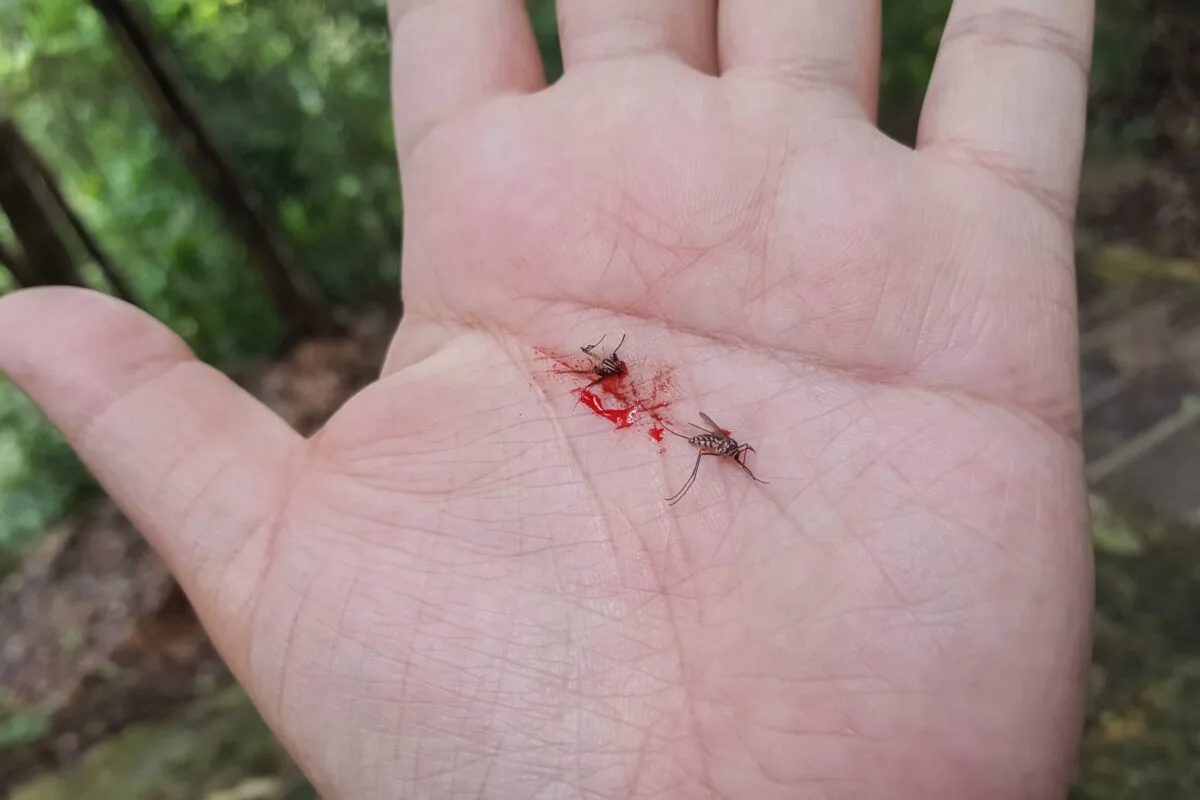
I love a good cheesy fridge magnet. You know the type; goofy magnets picked up on your travels, or the one you got from your office Secret Santa that reads, “I’d rather be (insert hobby)ing!”
The best fridge magnet I’ve ever seen is Noah standing on the deck of the ark, with animals peeking out from behind him. Printed below the ark is, “If Noah had been smart, he would have swatted those two mosquitoes.”
Seriously, dude, way to drop the ball.
But I share that to make a point.
The human race has been fending off the hungry bites of female mosquitoes for our entire existence. And yet here we are still looking for effective methods to repel mosquitoes.
Mosquitoes are much more than a summertime nuisance in many parts of the world. They carry some nasty diseases. Dengue fever, West Nile virus, and Zika virus, to name a few.
By far, the most well-known and deadly mosquito-borne illness is malaria, affecting nearly half the globe and racking up a staggering 240,000,000 cases annually. Malaria kills around 600,000 people worldwide each year. (WHO.com)

Unfortunately, nearly three out of every four of those 600,000 deaths are children under five.
Well, Trace, that took a dark turn.
I promise I’m not looking down from my high horse implying that you should suck it up, buttercup, with your backyard mosquitoes because there are children in Africa who are dying. That’s not what I’m saying.
What I’m getting at is this.
Mosquitoes are one of the most researched disease vectors on the planet because they kill people, lots of people, and most of them are children. If something as simple as burning citronella incense sticks or spraying yourself down with your favorite essential oil were effective, malaria wouldn’t be endemic to most of Africa.
But it is.
So why is the internet littered with hacks, blog posts, YouTube videos and ads touting natural methods of mosquito repellent that don’t work?

Because we’re optimists! We want them to work because, in theory, they’re better than the nasty chemical alternatives.
But why don’t they work?
Why Essential Oils & Other Botanicals Aren’t Effective

Look, I’m just going to come right out and say it – essential oils suck at repelling mosquitoes. The problem with using them has to do with their very nature. Essential oils are:
Highly Concentrated
We think essential oils are safe because they’re natural, which is funny when you think about their purpose in nature. Plants produce essential oils via glandular trichomes (your tomatoes are covered in them) or other secreting organs to fill any number of roles: attract pollinators, prevent water loss, and defend against other plants and animals (many of these oils are toxic to other plants and animals).
These are powerful compounds in the plant world.
And then we take them and distill them, making them even more potent. Nearly all essential oils need to be blended with a carrier oil to be safely used topically, and even then, the dilution differs from oil to oil based on the compounds in the plant and whether or not it’s phototoxic.
Volatile
Essential oils are highly volatile. They need to be stored in dark, cool places to retain any purported benefits. So, not where mosquitoes hang out.
Essential oils and most other botanicals begin to break down immediately when you take them out of the bottle. They oxidize in the air, the sun and, if applied topically, from the heat of your skin. If you’re sweating, they break down faster. So even if you find one that does repel mosquitoes, it’s only for a little while. The constant need to reapply makes them a poor candidate for repellent.
Unregulated
Essential oils are completely unregulated by the FDA. There are no regulations imposed on the companies who manufacture them.
- Is this safe to use on my skin, diluted or undiluted?
- Is it safe to use internally?
- Are the ingredients mixed with any synthetics?
- Is this oil photosensitive? (Will it burn the crap out of my skin if I go outdoors?)
- Has the product been stored and shipped properly to maintain potency?
- Is there an expiration date?
Who knows?
You have no assurance of the quality and safety of the product you purchase beyond what the company chooses to put on its label.
Research Has Shown They’re Ineffective
Most research into essential oils as mosquito repellents has proven that they either don’t work or only under strict laboratory conditions, i/e, no sun, no perspiration, with your arm stuck in a box full of mosquitoes.
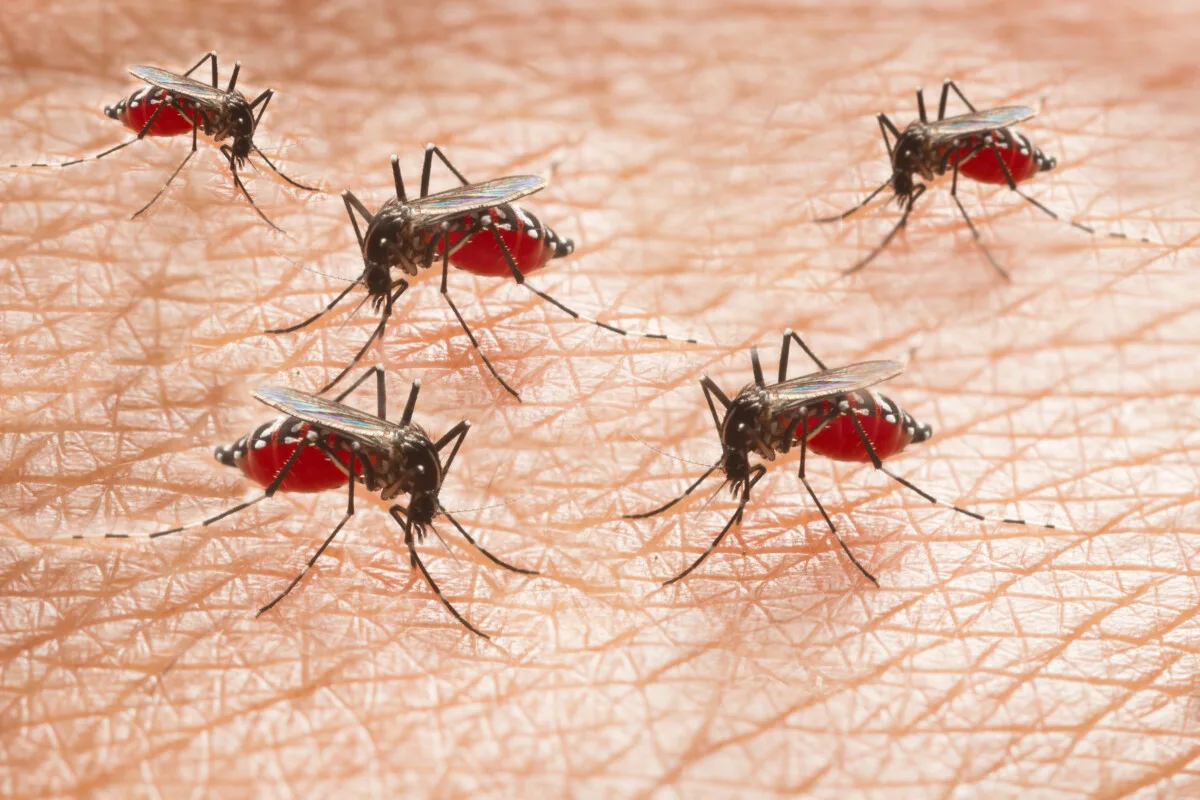
For instance, here is a study of 38 different essential oils. Know what they found?
“When the tested oils were applied at a 10% or 50% concentration, none of them prevented mosquito bites for as long as 2 h, but the undiluted oils of Cymbopogon nardus (citronella), Pogostemon cablin (patchouli), Syzygium aromaticum (clove) and Zanthoxylum limonella (Thai name: makaen) were the most effective and provided 2 h of complete repellency.”
Two important things jump out at me:
- The diluted oils didn’t work. (And that was in a lab.)
- They put undiluted essential oils on a volunteer’s skin.
In the essential oil community, clove oil is known as a “hot oil,” meaning it is a huge no-no to use undiluted as it can burn your skin. If you read the study, one drop (.1mL) was applied to a 2”x3” (30 cm2) patch of skin. To cover all the areas of exposed skin when you’re outdoors and get your two hours of protection, you would need to apply a dangerous amount of undiluted oil to your skin.
Please, please, please don’t do that.
Also, clove essential oil is phototoxic! Phototoxic essential oils (and there are a lot ‘em) contain molecules called furanocoumarins which cause your skin to become photosensitive, resulting in severe burns.
Even if it was safe to put any of these oils on your skin undiluted (remember, the only concentrations found effective were undiluted), and they held up to being exposed to sun, air, and sweat, I sure hope you like the way they smell in their most potent form because you’re going to need to wear a lot of it.
But What About Scented Candles or Plants?
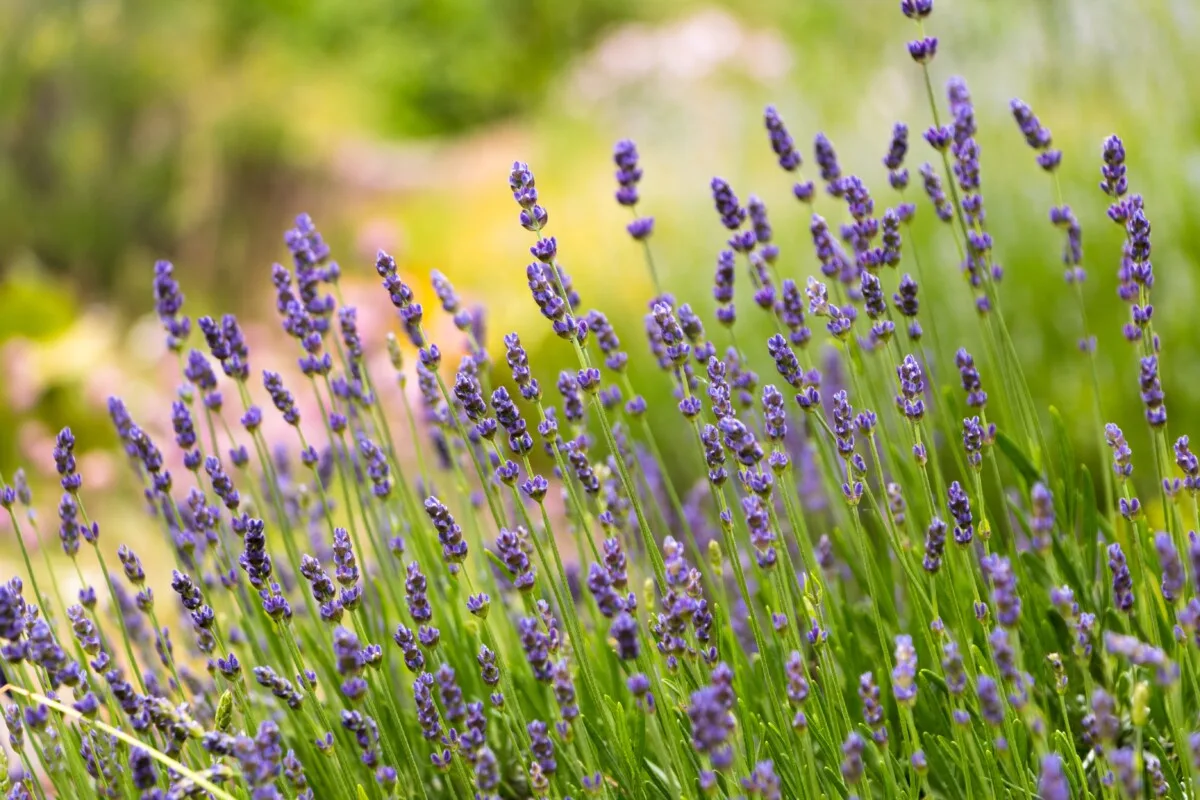
Well, that’s a pretty easy one. If the distilled essential oils from plants are ineffective at repelling mosquitoes, then the unconcentrated amounts found in plants aren’t enough to repel mosquitoes either. Currently, no research shows any plants are effective at repelling mosquitoes. Nope, not even citronella.
And as for candles, again, botanical or essential oils are not good options for repelling mosquitoes. The smoke from the candle is better at deterring them.

Carbon Dioxide Mosquito Traps
We’ve known for quite some time now that one of the ways mosquitoes find humans to nibble on is the carbon dioxide we breathe out. So, it’s unsurprising that quite a few DIY carbon dioxide mosquito traps have popped up, like this one.
In theory, these should work. However, you need to consider how mosquitoes use CO2 to find us. They look for pulses of CO2 (breathing in and out) rather than a steady stream. They also use our body heat, color and smell to find us, so they’re using a lot of information to detect humans beyond carbon dioxide.
While you may catch a few mosquitoes with these types of traps, you would need quite a few of them around your yard/patio for them to provide effective coverage.
Take Back Your Backyard
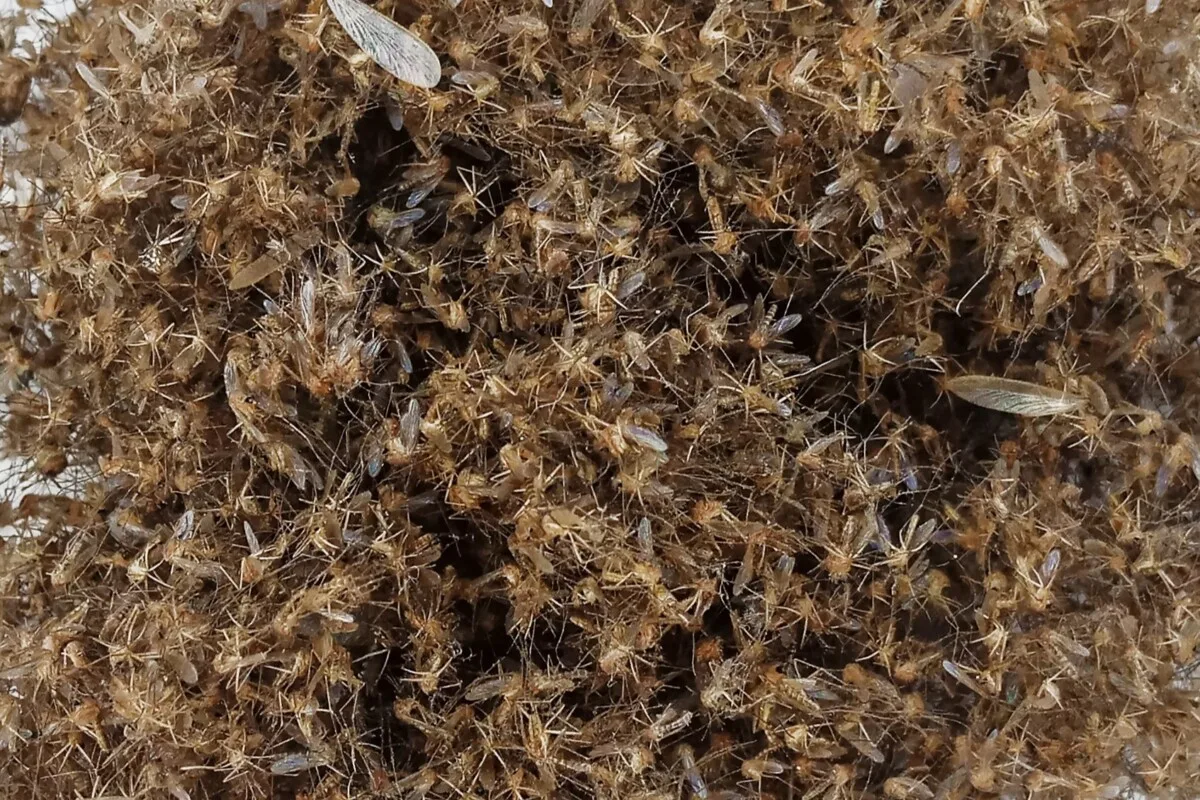
If you’re serious about enjoying a bite-free summer, you need to take a multilevel approach. We usually think of mosquito repellent as something we put on, but removing them from your environment can be more effective than trying to keep them away from you. Adopting as many of these suggestions and mosquito traps as possible will give you the best defense.
Eliminate Breeding Grounds
Mosquitoes require still water to lay their eggs. And they will use any still water they can find, whether that’s your wheelbarrow you forgot to flip over, the birdbath in your flower bed, that bucket out behind the shed, or that puddle that never seems to dry out at the end of the driveway.
One of the most effective things you can do to keep mosquitoes at bay is to remove as many opportunities for them to lay eggs in your backyard as possible. While it’s impossible to remove all standing water, being diligent about not giving mosquitoes a place to breed will help significantly.
This is especially important if you live in areas with mosquito-borne illnesses.
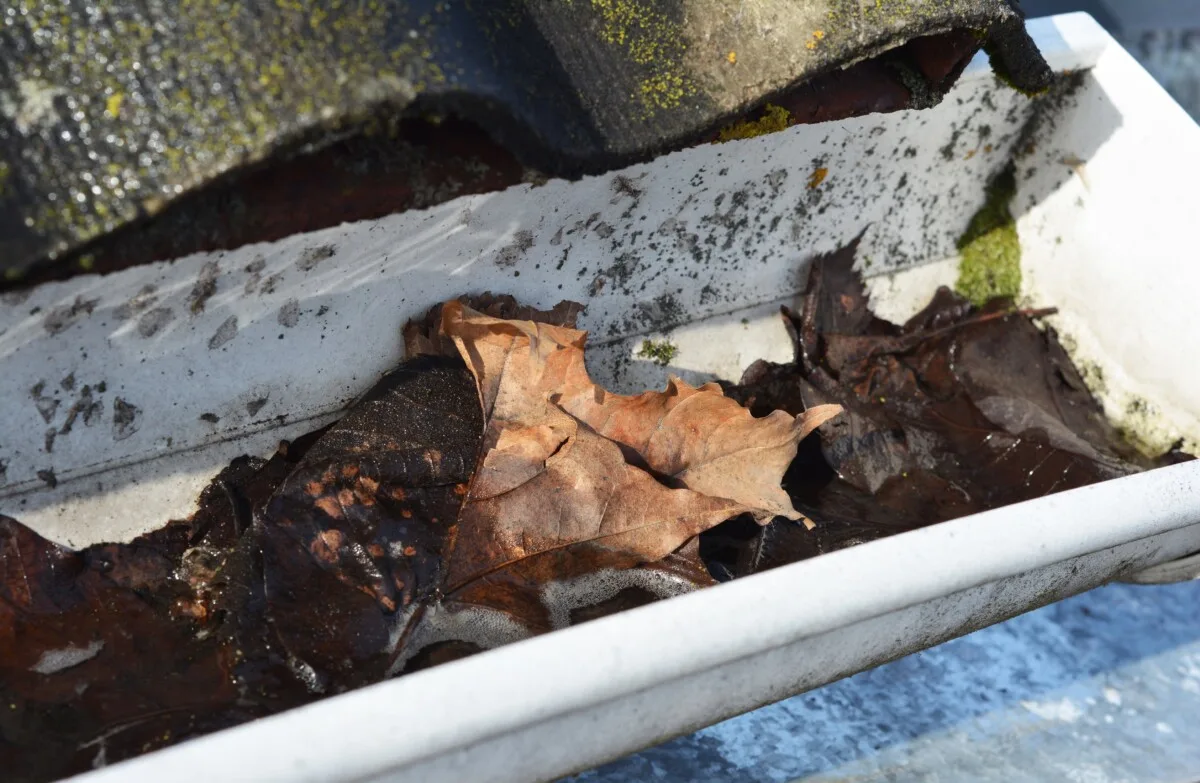
- Add a fountain to decorative ponds and birdbaths to keep the water moving.
- Always put tools away.
- Flip over anything that can hold water if stored outside, i.e., buckets, wheelbarrows and even shovels.
- Add sand or other filler to puddles that last more than a week.
- Clean gutters frequently during the summer.
Wear Light-colored Clothing in the Summer
Not only will you stay cooler, but you’re 100% guaranteed to drop a bbq-sauce-covered chicken wing on your white shorts! Oh wait, no, that’s just me.
Mosquitoes are attracted to darker colors and some bright colors such as black, navy, cyan, red and orange. Choose light, neutral colors, and you’ll be less of a target. Convince your least favorite relative to wear dark colors all summer and use them as bait for top effectiveness.
Screens
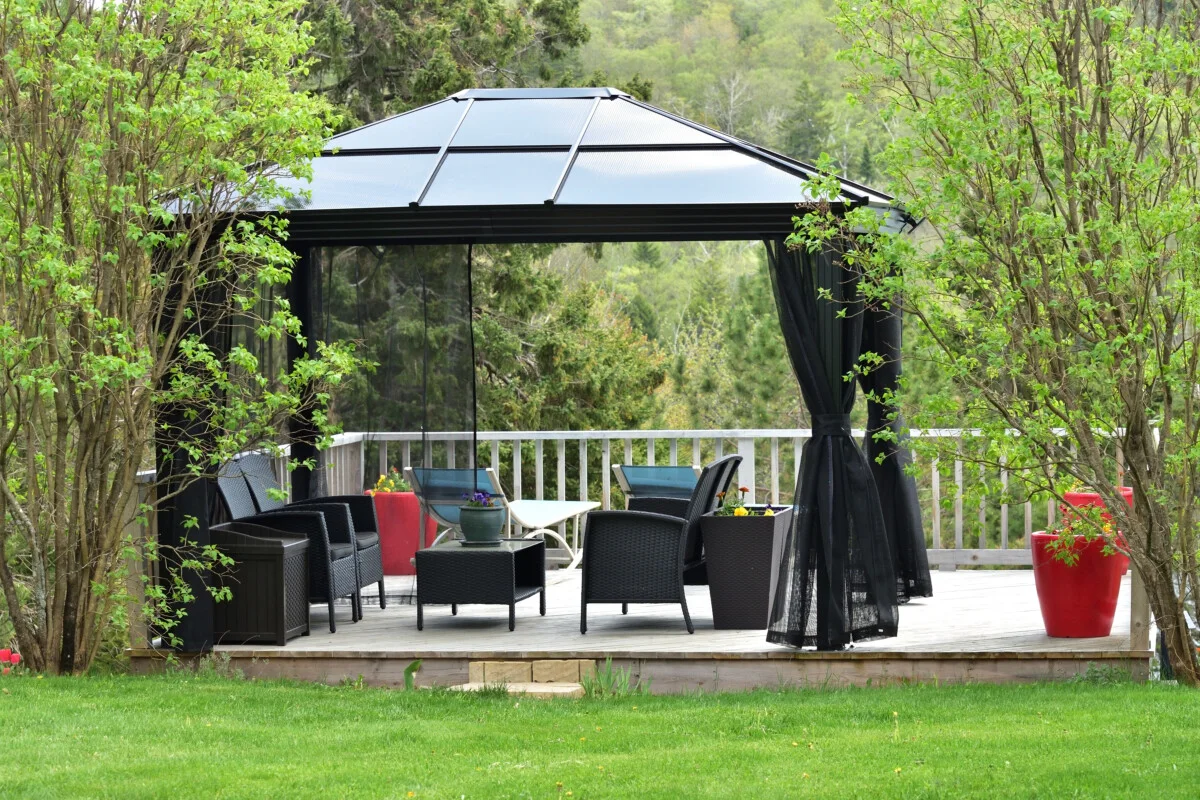
There is a reason bed nets are used so often in areas where malaria is a danger – they work. Simple but effective, screens are a great way to keep mosquitoes away while you’re enjoying the outdoors.
There are plenty of inexpensive screened tents on the markets these days. There are even portable pop-up options! You can even install roll-up screens around your porch. Whether you’re looking to cover a small space or create a large backyard haven, investing in a screen tent takes you and your family off the mosquito menu for the summer.
Heading out to the woods for some hiking? Opt for a hat with a head net to keep all the bugs out, not just mosquitoes.
Start a Fire

Mosquitoes do not like smoke. Burn smoky candles (usually, the cheaper they are, the smokier they are) around the perimeter of where you’ll be hanging out to help deter mosquitoes.
If you can, a campfire is an excellent way to deter mosquitoes. Although, it can also deter humans if it’s too smokey.
Use Air to Repel Mosquitoes Naturally
Ah, mosquitoes, for as savage as they are, they’re quite delicate little buggers, aren’t they? They can’t fly at wind speeds greater than 10 mph.
Huh, you know what creates wind speeds greater than 10 mph?
Your average box fan. Also, your average ceiling fan set on high. Set up a couple of inexpensive box fans on your porch or patio to create an easy, mess-free, safe, and natural mosquito-free zone. Not to mention, it will keep other bugs at bay.
Consider adding an outdoor ceiling fan to your porch for a more permanent solution. Don’t forget the swing and the lemonade.
Fan Trap
While you’re at it, use a box fan and some window screen to create one of the most effective mosquito traps out there. Cheap, safe for the environment and easy, this mosquito trap takes minutes to set up and is ridiculously effective.
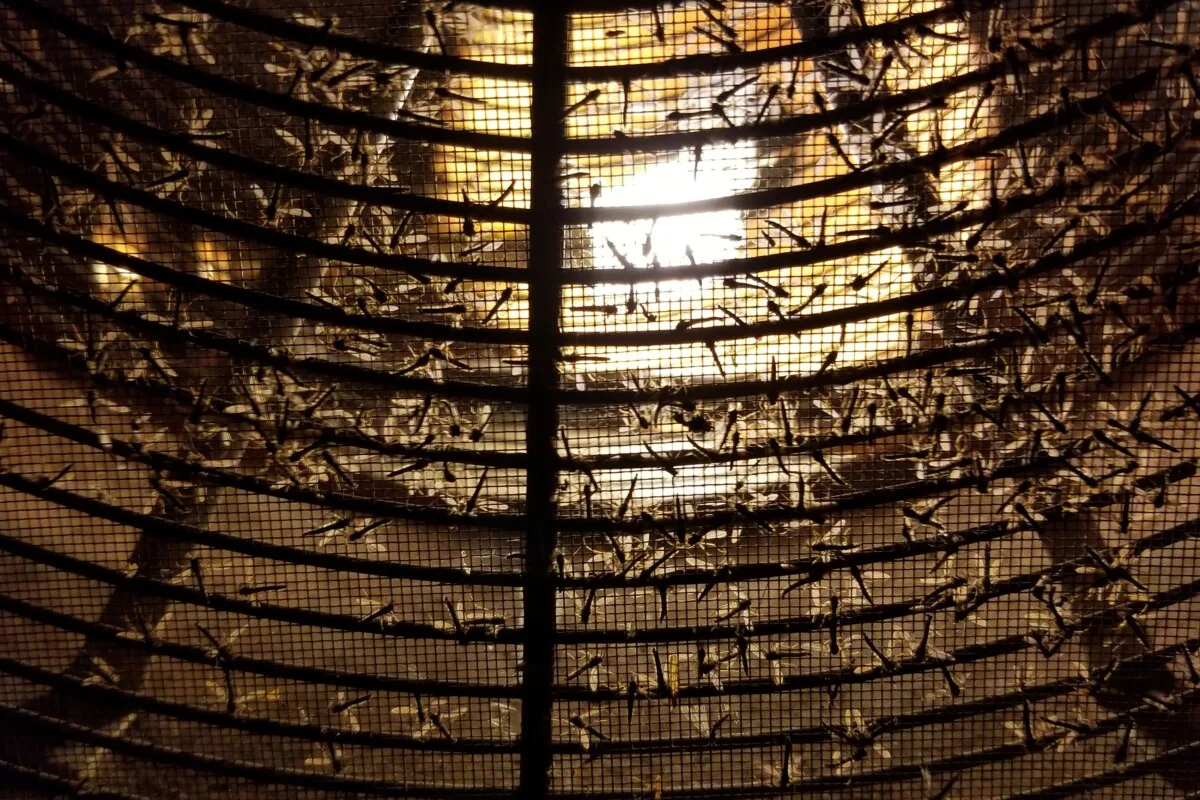
Bucket Larvae Traps
Another ridiculously effective trap uses dark, 5-gallon buckets. These are what we use on our property with amazing results. This is the method recommended by Doug Tallamy, author of Nature’s Best Hope: A New Approach to Conservation That Starts in Your Yard (which you should read if you haven’t).
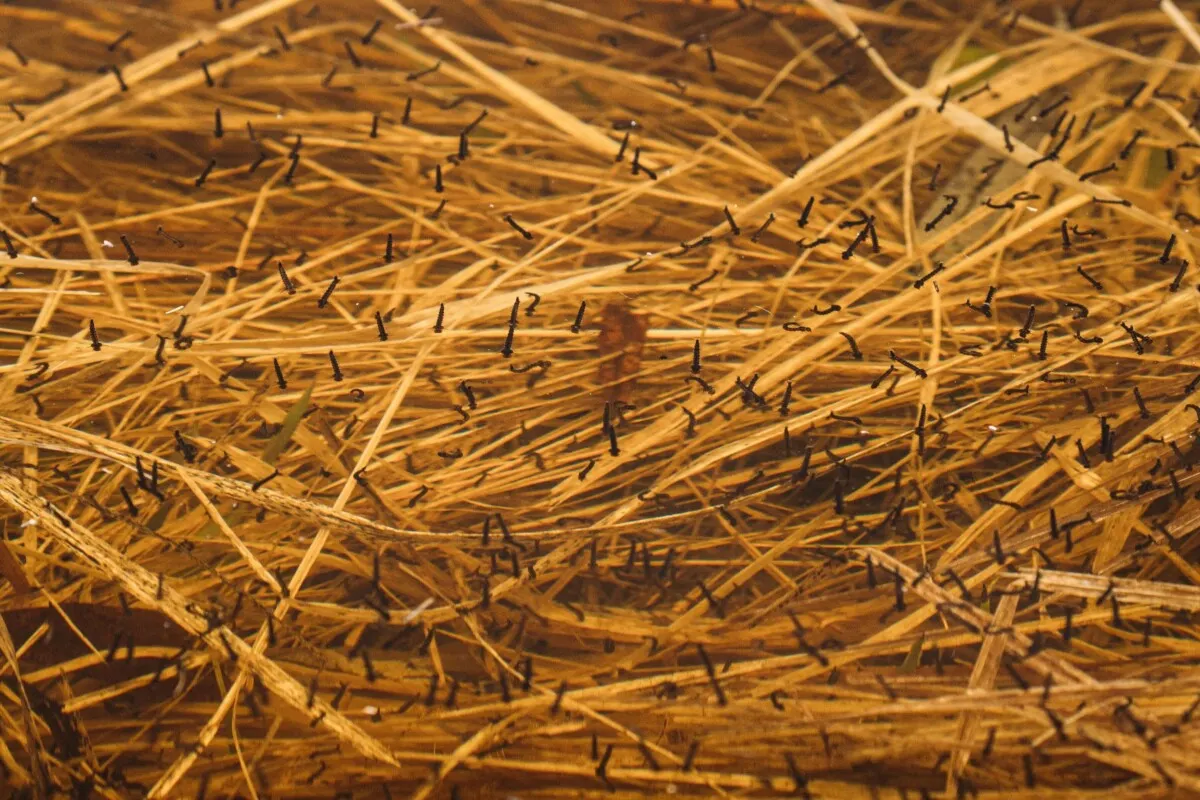
You’ll need mosquito dunks, which are inexpensive and safe.
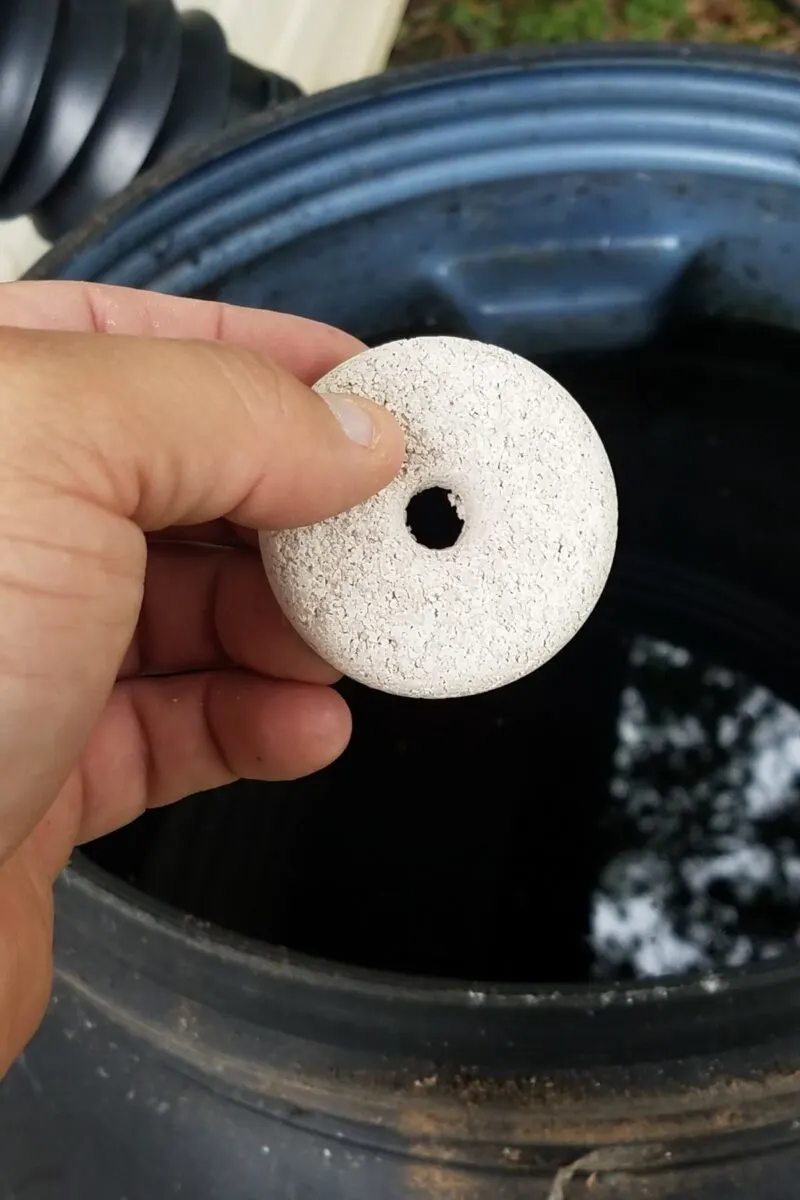
A Case for DEET – Have we been misled?
Finally, I want to talk about DEET.
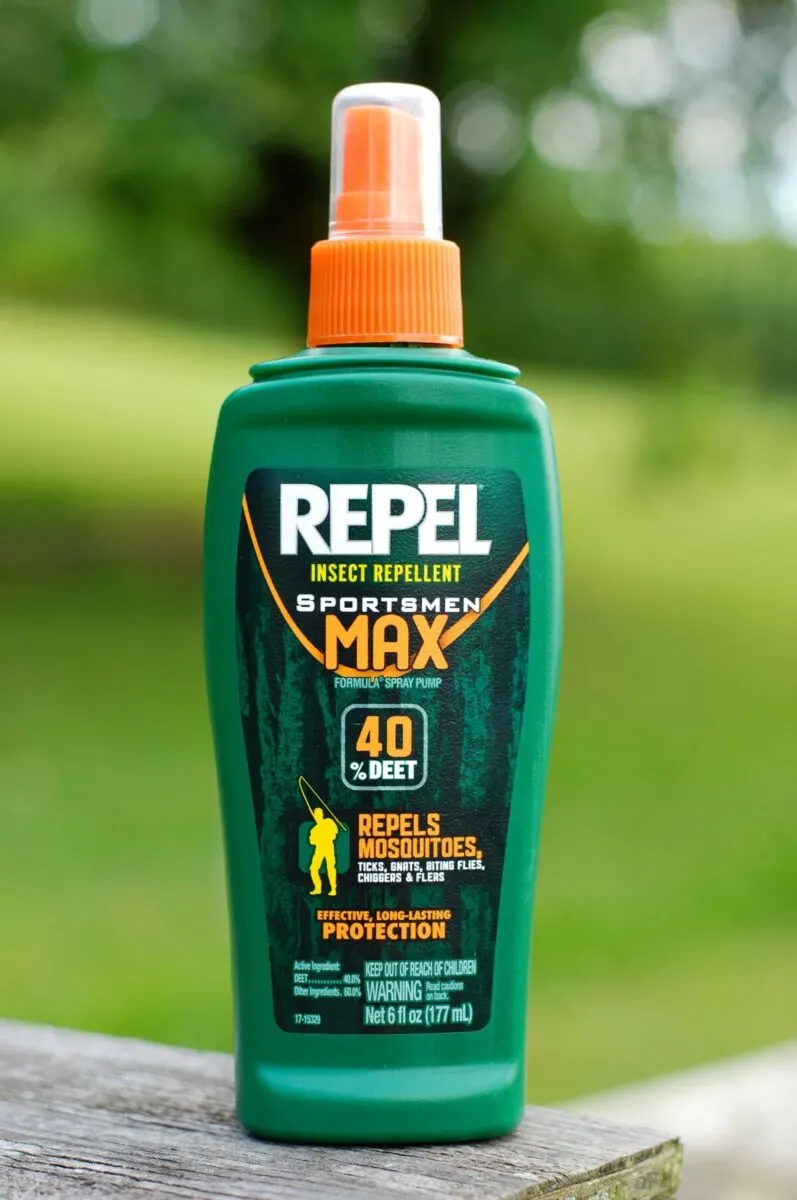
DEET is probably the most hated-on insect repellent out there. If you ask most people why they don’t like DEET, you’ll get one of three answers:
“It’s bad for the environment.”
“It’s a dangerous chemical.”
“It stinks and makes my skin feel gross.”
But here’s the thing, if you ask them why it’s bad for the environment or a dangerous chemical, most folks are hard-pressed to come up with facts to support their opinions.
That’s because most of us formed our opinion of DEET from hearsay and scary headlines back in the 80s and 90s. It’s usually something about killing birds or kids having seizures and dying. Sometimes people will point to manufacturers lowering DEET concentrations in their formulations “because it’s so dangerous.”
To this day, some of the most effective mosquito-repelling tools used in the fight against malaria are DEET and permethrin. So, is DEET the big, scary chemical most believe it to be?
DEET is Not DDT
First, let’s get one thing straight. Many people mistake DEET for DDT. They are not the same thing.
DDT, or Dichlorodiphenyltrichloroethane, was a common pesticide used around the mid-century to kill mosquitoes and many other pests. It was instrumental in the fight against malaria in Africa as the mosquitoes didn’t become resistant to it. Rachel Carson’s famous book, “Silent Spring,” brought worldwide attention to the environmental effects of DDT. Her efforts eventually led to DDT being banned in the States and many other countries.
DEET and the Environment
Many people hesitate to use chemicals because they’re concerned about what happens to them when they make their way into the soil, the air and the water. And these are all good things to be concerned about. Doing your due diligence to make an informed decision is always a good idea.
So what does happen to DEET in the environment?
It degrades and gets broken down. Quickly, too. DEET does not stay in the environment for very long. In the air, it is broken down by the sun within hours. In the soil, it is broken down by the naturally occurring fungi (go mushrooms!) and bacteria in the ground in days. And in the water, DEET is broken down by aerobic microorganisms (usually bacteria) again in a matter of days. (CR.com)
The container the repellent comes in is probably more of an environmental issue than the DEET itself.
DEET and Your Kids (And You)
We all want to know what we’re putting on our skin is safe. Again, do your due diligence when making a decision.
Back in the 80s and 90s, there was a big media to-do about DEET leading to seizures, coma and death in as little as an hour….wait for it…when ingested. Naturally, the media went wild with terrifying headlines. (Shocker, I know.)
I’m gonna go out on a limb here and assume that most of us know better than to drink DEET.
Studies showed that the scary effects of ingesting DEET are related to its concentration in our blood and that our bodies can’t metabolize or excrete it fast enough at those levels. But what about when we apply it as directed? (Dermally, rather than chugging it.)
From the study:
“For example, 10–12 g of a 75% DEET solution applied to the skin can lead to a blood concentration of about 0.0005 mmol/L; ingestion of a similar amount of DEET can result in a blood concentration that is hundreds of times higher (1 mmol/L). The latter concentration has been associated with seizures and death. The elimination half-life of DEET is 2.5 hours, and most of the body load is metabolized by hepatic P450 enzymes, with only 10%–14% recovered unchanged in the urine.”
Did you get that? When applied to the skin, most of it is metabolized by our body within a few hours, and we pee the rest out.
So, just to be clear, don’t drink DEET.
I encourage you to read the study, “DEET-based insect repellents: safety implications for children and pregnant and lactating women,” and decide for yourself.
DEET Concentration
But what about companies using less DEET in their products?
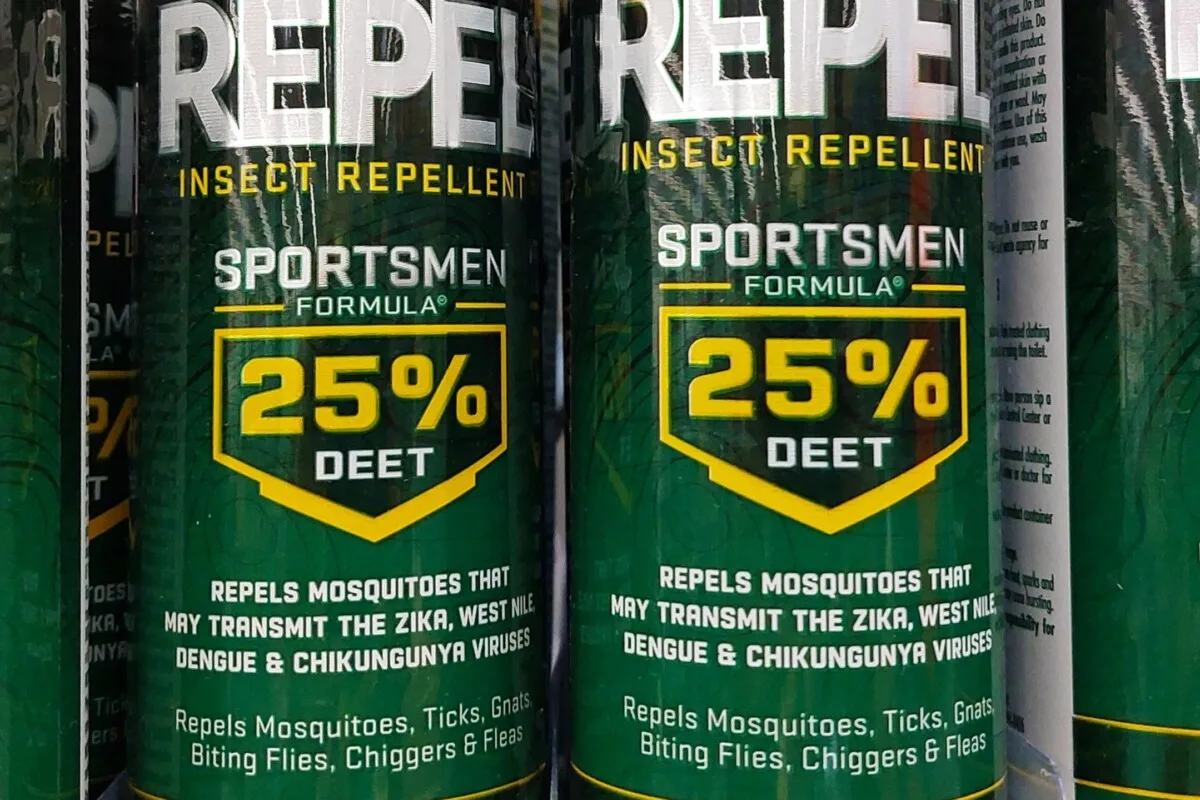
Easy, it’s a money saver. We found that the higher the concentration, the more effective DEET is at repelling mosquitoes. But once you reach 50% concentration, you hit a wall and no longer gain longer-lasting coverage with higher concentrations. For example, 50% DEET will keep you protected longer than 30% DEET, but 75% DEET works as long as 50%.
Products containing DEET at concentrations above 50% are redundant.
And as far as DEET smelling bad and making your skin feel greasy. Yeah, I got nothing. I agree. But I still don’t go into the woods without it.
Bottom line: DEET is safe if used as directed. In other words, don’t drink it. Store it where you would other things you don’t want kids to access in your house. Use the lowest concentration possible to achieve effective results, i/e: you may want 30% DEET when hiking in the woods but only require 5-10% DEET when chilling around the backyard firepit. And wash it off as soon as you’re done enjoying the great outdoors.

Get the famous Rural Sprout newsletter delivered to your inbox.
Including Sunday ramblings from our editor, Tracey, as well as “What’s Up Wednesday” our roundup of what’s in season and new article updates and alerts.

